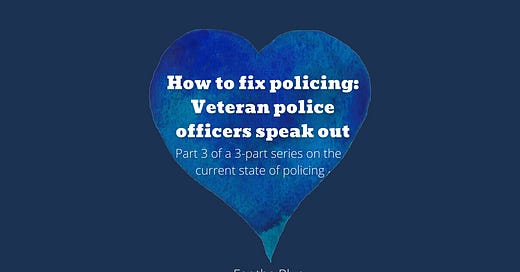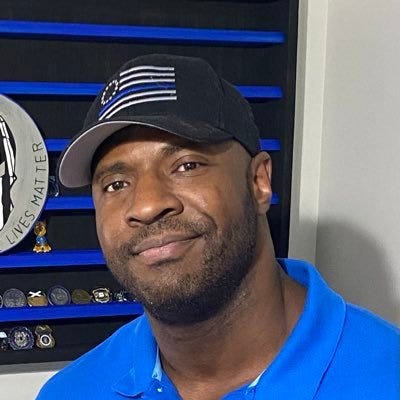How to Fix Policing: Veteran Police Officers Speak Out
Part 3 of a 3-part series on the current state of policing
Our nation has endured turbulence throughout its relatively short history. Two world wars, a civil war, a Revolution, the 9/11 terror attacks, a stock market crash, civil unrest, crime surges. Yet we always endured.
What we’re going through now feels unbeatable because we’re smack dab in the middle of it. Put into historical perspective, we have the ability to overcome this current culture war - a war that’s damaged policing and dismantled law and order.
This doesn’t mean it’ll be easy.
It’s not just that policing has been broken into tiny pieces, either. The values that have served as a foundation during some of this nation’s toughest periods -the nuclear family, a quest for exceptionalism, academic rigor, patriotism- have been misplaced or are at risk of becoming obsolete. Newer factors, like the consolidation of media power and an overreliance on social media also make our journey that much more difficult.
What will it take, then, to restore law and order? In the final installment of this three-part series, veteran police officers explain what needs to happen to fix policing.
If you haven’t already, check out the first two installments of this series for additional insights: Veteran Police Officers Explain Why Policing is Broken and Policing is Broken. Can it Be Fixed?
About the Panel
The people contributing their thoughts to this series are accomplished law enforcement professionals. You can read more about their impressive careers in the first installment.
Chief of Police (Ret.) Michael C. Koval, City of Madison (WI) has a law enforcement career that spans 37 years, two of which were performed as a special agent for the Federal Bureau of Investigation. During his 35-year career at the Madison Police Department, Koval served in a number of critical roles, including as SWAT hostage negotiator, field training supervisor, and lead legal instructor. As chief of police, he created MPD’s dedicated mental health unit; championed community policing; and expertly balanced the needs of the community with that of the safety and well-being of his officers - all during a tumultuous time for law enforcement.
Sergeant Zeek Arkham has 15 years of law enforcement experience at a major city police department. He’s also the host of Reasonable Suspicion, a podcast that centers on policing and other contemporary issues. He’s a strong and articulate voice for law enforcement at a time when policing continues to be under attack.
Sergeant Betsy Brantner Smith is a 29-year veteran of a suburban Chicago police department, where she worked in a number of critical roles including investigations, narcotics, hostage negotiation, and field training. She’s a speaker and prolific author, and currently serves as the National Police Association’s media analyst and spokesperson.
Dave “JD Buck Savage” Smith is a former police lieutenant who’s held a number of key positions including in SWAT, narcotics, and training & management. He’s currently a speaker, noted law enforcement trainer, and frequent writer for a number of police journals.
Why Staying Silent is a Bad Strategy
Keeping a low profile and placating police critics in the hope that things will improve on their own may seem like a safe option, but the strategy has thus far backfired.
Inaction has allowed the loudest voices to dictate public policy (like bail reform) that has emboldened criminal offenders, created victims, and put the rest of us at increased risk.
Attacks on police, including ambush-style ones, are at historic levels. Police departments across the country are experiencing staffing crises. Zealous prosecutors are indicting cops for past acts that had already been cleared by authorities.
We clearly need a new strategy.
“From politicians to union boards to police chiefs, sheriffs, and their respective national platforms, the collective silence has been deafening, at times. Perhaps it is out of fear of being marginalized, labeled, or just hoping to ride out the ‘storm’ out of a mistaken belief that what we are experiencing is fleeting or temporal is dangerous,” says Koval.
There are exceptions. Organizations like the Fraternal Order of Police (FOP), Patrolmen's Benevolent Association of the City of New York (PBA), and the National Police Association have been at the forefront of this fight, pushing back against false narratives.
The majority in law enforcement, however, seem resigned to their fate. Yet without more noticeable pushback, how can we not expect more of the same?
“Unless there are conscious and intentional efforts to counter punch, the lack of a response will be construed as a tacit acknowledgement of narratives that are not supported by data and only perpetuates false perceptions,” Koval adds.
A Commitment to the Truth
It’s become increasingly difficult to arrive at the truth. Journalists have largely become political activists. Voices are censored on social media. The media has been consolidated by corporate interests that are vested in bias. I read everything with a healthy dose of skepticism.
It’s precisely the truth, however, that is desperately needed.
“This may be a fantasy, but activists, politicians, police leaders, and especially the media MUST begin dealing in FACTS, not the fiction that somehow ‘police are the problem.’ Police use of force statistics are readily available, as are crime statistics, including who commits crime and where crimes are committed,” the Smiths say.
Academia is also complicit. “Academics need to return to their objective research, with such fields as Criminology needing to reassess their political bent and focus on true analysis and problem solving,” the Smiths say.
Anti-police narratives are even being taught at the primary school level. Impressionable minds are being fed a doctrine that will help fuel future animosity towards law enforcement.
Top Priority: Electing True Public Servants
Though I’ve always been cynical of politicians, the summer riots of 2020 made me realize how little our elected officials think of us. As our cities burned, police officers were being ambushed, and citizens put in harm’s way, they largely ran for cover. It felt like a betrayal.
Moreover, so-called law and order politicians have had opportunities to protect police officers by co-authoring bills like the Protect and Serve Act, which would add federal penalties for attacking a police officer. Yet, as of this writing, the bill has just 73 federal co-sponsors; just one U.S. representative in my state.
We need better elected leadership. “I believe that there will have to be wholesale changes in political leadership in which the virtues of being a guardian to the community as a cop are encouraged and applauded rather than blamed as the ‘tip of the spear’ for an inherently racist society,” says Koval.
Arkham agrees. “Elected officials need to support their officers, make it okay for cops to be proactive, and strictly condemn criminals. If these elected officials think that they can play both sides and try to appease everyone, they’re going to fail.”
The November mid-terms are an opportunity for us to change our trajectory. We can’t however, think that electing new people will solve all our problems.
Cops Need to Become More Involved in the Process
Change will require police officers to become more politically aware, the Smiths say.
“We must realize that our profession is under attack, and we are being used as political pawns not only to the detriment of our profession, but more importantly, to the detriment of our citizens, our communities and ultimately, to the American way of life. Police officers will undoubtedly continue to realize that for their own self-preservation they will need to flee their anti-cop cities and counties for friendlier communities.”
Cops understandably fear retribution, even sometimes from within their own ranks. This is why strong police unions are vital, and why cops must insist that their unions provide zealous representation. If a police union can’t speak up for officers under attack, what exactly, is the point of having a union?
Forging positive partnerships
Enlisting the support of community partners and constituents is critical in efforts to reset the narrative, says Koval.
“If you have members of the community who are willing to be a part of the campaign, you can develop stories and examples of authentic, grass roots relationships that have resulted in positive outcomes. Those ‘testimonials’ are more compelling when they come from the people we serve rather than the public information officer’s desk.”
It’s this very type of relationship that Koval forged between the community and the Madison Police Department. It’s a relationship that can emerge when the police chief is a true leader and guardian, not a politician.
Wanted! Police leaders with hearts of courage
“Weak police leaders must also bear some responsibility for their failure to support their officers and protect their citizens,” the Smiths say.
In his book, The Courageous Police Leader, Travis Yates argues that policing’s number one enemy is “the cowardly police leader.”
He writes, in part:
“. . .instead of guarding the proverbial castle, cowardly leaders let social justice “warriors” stroll through the front gate to announce their demands. And instead of motivating and inspiring others, cowardly leaders kill morale at every turn.”
At a time when policing is in dire need of strong leadership, the war on police has made it more difficult to attract true leaders.
The Citizenry Can No Longer Be Complacent
Law and order is foundational to this nation. Without it, we will fail.
“Freedom is a word that, as Americans, we tend to toss around quite liberally, and yet our freedoms are being eroded in part by violent criminals who are taking over the streets of some of our largest and most famous cities,” the Smiths say.
We didn’t ask for this crisis, but here we are; and thus, the burden for change is on all of us. “The American public must DEMAND a criminal justice system that favors safety and freedom, not criminal activity,” the Smiths add.
Effective ways to fight back
Speaking up can be intimidating, but silence is no longer an option. The first amendment guarantees the right to express ourselves, provided that speech is expressed within the limits of the law. Practice that God-given right! Frequently. We can’t keep running in fear.
If you need inspiration to fight effectively for cops, this article might help.
Demand accountability from our elected officials. Tell them to protect police officers by co-signing bills like the Protect & Serve Act. Make it clear that allowing repeat offenders to prey on innocent civilians is an assault on our liberties.
Challenge the media. When they write stories that are false or misleading, set the facts straight with a letter or op-ed.
If you’re a parent, do you know what your kids are being taught in school? If the curriculum includes anti-police bias, speak out against it at school board meetings.
If you’re a police officer, demand that your union speaks up when the media, politicians, or civilians unfairly targets members within your ranks. Collectively, you have more power than you think.
Support your police department. There are a number of ways to defend our defenders. The vetted ideas in my article, 7 Ways to Honor Cops This National Police Week can be implemented year-round.
Help vet November candidates. I’m in the process of sending questionnaires about policing to candidates running in the November election. The results will be made available on this site. Please consider helping in your own state. Details to follow shortly.
We can again become a nation that prioritizes law and order and that respects its cops. It won’t happen without all our voices.
If you like what you just read, please consider sharing this post and subscribing to For the Blue. This site is revenue-free & my advocacy is performed on a volunteer basis.












